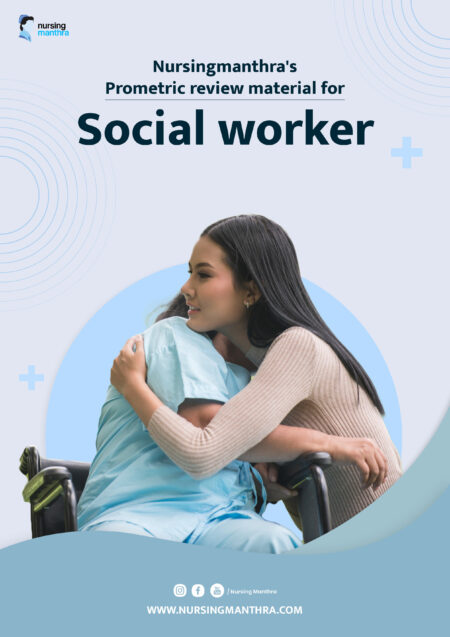Nursing Manthra’s Review Material for Community Development Authority – Psychologist
AED200.00 AED150.00
Question bank Contents:
Total questions : 500+
Total pages : 100+
Contains: Questions-Optional-Answer with Rational
Read Only Option Available.
Validity-1 year
Click to view sample material
-Previously asked MCQ
Description
Nursingmanthra’s Prometric Review material for Psychologist-Community Development Authority (CDA), Sharjah Social Service Department (SSSD) and Department of Community Development(DCD),Abu Dhabi..
- Developed by Nursing Manthra with input from Registered Psychologist.
- Covers essential topics with numerous multiple-choice questions. Updated version 2025.
- Applicable to various exam formats such as written exams and CBT including prometric.
- Aims to enable first-attempt success with a strong understanding of concepts.
- Yearly updates based on questions from different authorities.
- Suitable for international licensing exams in various countries.
Syllabus:
Domain 1 – Biological Bases of Behavior (10%)
KN1. Functional correlates and determinants of the neurobiological and genetic bases of behavior pertaining to perception, cognition, personality, and mood and affect in normal, acute and chronic neurobehavioral disease processes and disease comorbidities
KN2. Drug classification, mechanisms of action, and desired/adverse effects of therapeutic agents, drugs of abuse, and complementary or alternative agents
Domain 2 – Cognitive-Affective Bases of Behavior (13%)
KN3. Major research‐based theories and models of intelligence and their application
KN4. Major research-based theories, models, and principles of learning and their application
KN5. Major research‐based theories and models of memory and their application
KN6. Major research‐based theories and models of motivation and theirapplication
KN7. Major research-based theories and models of emotion and their application
Domain 3 – Social and Cultural Bases of Behavior (11%)
KN11. Major research‐based theories and models of social cognition (e.g., person perception, development of stereotypes, prejudice)
KN12. Social interaction and relationships(e.g., attraction, aggression, altruism, organizational justice, verbal and non‐verbal communication, internet communication, mate selection, empathy)
KN13. Group and systems processes (e.g., school, work, and family systems, job satisfaction, team functioning, conformity, persuasion) and social influences on functioning
KN14. Cultural and sociopolitical psychology (e.g., privilege, cross‐cultural comparisons, political differences, international and global awareness, religiosity and spirituality, acculturation)
Domain 4 – Growth and Lifespan Development (12%)
KN15. Normal growth and development across the lifespan
KN16. Influence of individual‐environment interaction on development over time (e.g., the relationship between the individual and the social, academic, work, community environment)
KN17. Major research‐based theories and models of development
KN18. Risk and protective factors that may impact a developmental course (e.g., nutrition, prenatal care, health care, social support, socioeconomic status, abuse, victimization, and resiliency)
Domain 5 – Assessment and Diagnosis (16%)
KN19. Assessment methods and their strengths and limitations (e.g., self‐report, multi-informant reports,
psychophysiological measures, work samples, assessment centers, direct observation, structured and semi‐ structured interviews)
KN20. Issues of differential diagnosis and integration of non‐psychological information into psychological
assessment
KN21. Criteria for selection and adaptation of assessment methods (e.g., evidenced-based knowledge of
assessment limitations, cultural appropriateness, trans‐cultural adaptation, and language accommodations)
KN22. Constructs of epidemiology and base rates of psychological and behavioral disorders
KN23. Major research-based theories and models of psychopathology
Domain 6 – Treatment, Intervention, and Prevention and Supervision (17%)
KN24. Factors related to treatment or intervention decision-making (e.g., relevant research, matching treatment to assessment/diagnosis, matching client or patient with psychologist characteristics, knowledge and use of allied services, cost and benefit, readiness to change)
KN25. Contemporary research-based theories and models of treatment, intervention, and prevention
KN26. Treatment techniques and interventions and the evidence for their comparative efficacy and effectiveness
Domain 7 – Research Methods and Statistics (5%)
KN27. Sampling and data collection methods
KN28. Critical appraisal and application of research findings(e.g., adequacy of design and statistics, limitations to generalizability, threats to internal and external validity, design flaws, level of evidence)
KN29. Evaluation strategies and techniques (e.g., needs assessment, process and implementation evaluation, formative and summative program evaluation, outcome evaluation, cost‐benefit analysis)
Domain 8 – Ethical/Legal/Professional Issues (16%)
KN30. Professional standards and relevant guidelines for the practice of psychology (e.g., standards for
educational and psychological testing)
KN31. Identification and management of potential ethical issues
KN32. Client and patient rights
KN33. Ethical issues in supervision
Book Details:
- It will help you to pass exam at first attempt if you study well
- The material will be sent to your shared Gmail account after confirmation of the payment
- Please note that Nursing Manthra’s study materials will be read only pdf file, which cannot be downloaded /printed or shared.
- The amount once paid will not be refunded at any circumstances
Reviews (2)
Based on 2 reviews
|
|
|
100% |
|
|
|
0% |
|
|
|
0% |
|
|
|
0% |
|
|
|
0% |
2 reviews for Nursing Manthra’s Review Material for Community Development Authority – Psychologist
Related Products
Question bank Contents:
Total MCQ-1000
Contains: Questions-Optional-Answer with Rational
Read Only Option Available.
Validity-1 year
Total MCQ-1058
Contains: Questions-Optional-Answer with Rational
Read Only Option Available.
Validity-1 year
1500 MCQs (incl. PYQs) + 200-page high-yield theory for RRB Paramedical (Staff Nurse). Subject-wise priority topics in crisp points—built to match the RRB exam pattern.
🔒 Important Notes
-
The study material is provided in read-only PDF format.
-
Downloading, printing, or sharing the file is strictly prohibited.
-
All sales are final. Once payment is made, no refunds will be issued under any circumstances.
Question bank Contents:
Total questions-1500+
Total pages-500+
It contains MCQ(multiple Choice Questions) with all options, correct answer and rational.
-Previously asked MCQ
Total MCQ-1360
Contains: Questions-Optional-Answer with Rational
Read Only Option Available.
Validity-1 year
Total MCQ-1000
Contains: Questions-Optional-Answer with Rational
Read Only Option Available.
Validity-1 year
Question Bank Contents
-
Total Questions: 2000
-
Multiple Choice Questions (MCQs)
-
Each question includes:
-
All answer options
-
Correct answer
-
Detailed rationale for better clinical understanding
-
-
Includes previously asked MCQs from past examinations
Question bank Contents:
Total questions-2000
Contains Question, option, answer and rational format
Total MCQ- 992 questions with answers
Total files-2
1 file with questions and another with surgical instruments
Total MCQ:
Total pages:
Contains: Questions-Optional-Answer with Rational
Question bank Contents:
Total questions-2000
It contains MCQ(multiple Choice Questions) with all options, correct answer and rational.
-Previously asked MCQ
Question bank Contents:
Total MCQ-1000
Contains: Questions-Optional-Answer with Rational
Read Only Option Available.
Validity-1 year
















Sajira –
I cleared my DHA exam in first short..study material is really helpful for my exam…thank you nursing manthra your support and guidance🥹
roshan mathew –
I liked the simple language. Even complex topics are explained in an easy way. Really useful for revision. Thank you nursing manthra